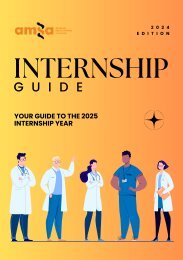Vector Volume 11 Issue 1 - 2017
Create successful ePaper yourself
Turn your PDF publications into a flip-book with our unique Google optimized e-Paper software.
million more people into extreme poverty by<br />
2030 through its impact on increasing vectorborne<br />
diseases, food insecurity, increasing the<br />
number of climate refugees and respiratory<br />
disease through air pollution.[3]<br />
Dr Alessandro Demaio, Medical Doctor for<br />
the World Health Organization (WHO) and cofounder<br />
of NCD-Free, addressed the connection<br />
between obesity and climate change. This is a<br />
potentially hidden link, but one not to be ignored:<br />
if food waste were a country, it would be the<br />
third largest CO2 emitter.[4] He emphasised<br />
the importance of collaboration on global<br />
issues such as obesity and climate change,<br />
“when it comes to NCDs and climate change,<br />
opportunities for co-mitigation are profound and<br />
unprecedented. Inaction cannot be an option.”<br />
He urged us to think laterally on<br />
the topic – both issues have<br />
similar causes and solutions,<br />
so how can we address them<br />
together through lobbying, policy<br />
change and targeted public<br />
health strategies?<br />
Local Solutions<br />
In the face of impending “climate chaos”,<br />
as it was colloquially referred to throughout<br />
the conference, it is easy to feel overwhelmed<br />
by the reality of climate change. Despite this,<br />
the speakers provided messages of hope and<br />
inspired action and empowerment through local<br />
solutions.<br />
Coming from a refreshingly non-medical<br />
perspective, Tim Buckley, one of Australia’s top<br />
financial energy analysts, provided an overview<br />
of the progress our neighbours in India and<br />
China are making in the renewable energy<br />
market [5]. He outlined the importance of<br />
knowing your audience – the motivation behind<br />
these nations’ transition to renewables wasn’t<br />
for health reasons, but economic reasons in<br />
India (considering renewables cost 80% of<br />
what it costs to import fuel) and populationdriven<br />
air quality concerns in China. Buckley<br />
highlighted the financial stability and success<br />
What makes climate change so<br />
difficult to comprehend is the lack<br />
of a clear, single perpetrator; it<br />
doesn’t have a face.<br />
these nations have had since leading the way in<br />
renewables and why it makes economic sense<br />
for Australia to follow suit.[6] Focusing the light<br />
on Australian shores, Dr Roger Dargaville from<br />
the Melbourne Energy Institute outlined the<br />
need for robust policy and strategic direction for<br />
the Australian energy market, if we are to move<br />
towards renewables and avoid further energy<br />
demand issues like the recent South Australian<br />
energy crises.<br />
Changing Perspectives and Summary<br />
I took away a bigger picture of how we<br />
conceptualise climate change, and left thinking<br />
that we need to change our perspective to<br />
achieve true change. What makes climate<br />
change so difficult to comprehend is the lack<br />
of a clear, single perpetrator;<br />
it doesn’t have a face. Without<br />
oversimplifying complex issues,<br />
it is clear that, for example, when<br />
we want to blame someone for<br />
the obesity epidemic we think<br />
of big corporate companies like<br />
Coco Cola or McDonalds. When we want to<br />
blame someone for displaced people and mass<br />
migrations, we think of war and governments.<br />
With climate change, it isn’t as easy to play<br />
the blame game. We can’t easily point the finger<br />
at someone or something and say “this is the<br />
reason why; this is the cause”. Because we can’t<br />
readily shift the blame onto something easily<br />
identifiable, it makes the issue less tangible<br />
and more challenging to connect with. There is<br />
nowhere to direct the anger and frustration at<br />
the catastrophic changes we are seeing around<br />
us, the natural response is to either disconnect<br />
with the issue, or to feel overwhelmed with<br />
despair and subsequently be driven to inaction.<br />
In truth, we should be pointing the finger at<br />
is ourselves. As was made abundantly clear<br />
at the conference and in countless articles<br />
and reviews presented by the wider scientific<br />
community, the evidence overwhelmingly<br />
indicates that climate change is largely human<br />
driven, and thus we must take responsibility.[7]<br />
48

















